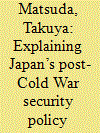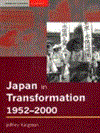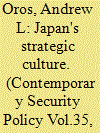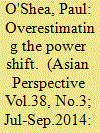| Srl | Item |
| 1 |
ID:
175662


|
|
|
|
|
| Summary/Abstract |
Why has Japan shifted towards a more active security posture since the end of the Cold War? Japan’s security policy under Prime Minister Abe has triggered numerous discussions on the changing nature of Japan as a security actor. This article identifies two independent variables—the balance of power calculations and secure access to the maritime commons—that informs Japan’s security policy trajectory. It argues that Japanese strategy is best described as ‘maritime realism’, a posture in which liberal internationalist and realist elements draw upon principles of maritime strategy to fuse together. Japan has not only actively facilitated US commitment to maritime Asia but also focused on expanding its role in maritime security as the maritime space in the Indo-Pacific has increasingly become a contested space. While Tokyo’s security policy corresponds with structural realist predictions, they have also been frequently expressed in liberal internationalist language given the peculiar nature of the role of navies. This article’s findings advance theoretical debates on alliance politics and great power competition by integrating international relations and concepts in strategic studies. It also contains significant explanatory power in assessing the trajectory of Japan’s defence policy since the end of the Cold War.
|
|
|
|
|
|
|
|
|
|
|
|
|
|
|
|
| 2 |
ID:
058172


|
|
|
|
|
| Publication |
London, Longman, 2001.
|
| Description |
xii, 230p.: mapspbk
|
| Series |
Seminar Studies in History
|
| Standard Number |
0582418755
|
|
|
|
|
|
|
|
|
|
|
|
Copies: C:1/I:0,R:0,Q:0
Circulation
| Accession# | Call# | Current Location | Status | Policy | Location |
| 044636 | 952.04/KIN 044636 | Main | On Shelf | General | |
|
|
|
|
| 3 |
ID:
089466


|
|
|
| 4 |
ID:
132869


|
|
|
|
|
| Publication |
2014.
|
| Summary/Abstract |
Japan has shown three distinct strategic cultures since its emergence as a modern state in the 19th century: isolationist and non-military, militarist, and post-World War II strategic culture characterized by great reluctance to use military power abroad, even in collective self-defence. This article examines Japan's strategic culture and the potential for a fourth distinct strategic culture through the broader framework of security identity, arguing that this is evolving but has not changed as much as one might expect due to institutionalized antimilitarism and political support for the security practices it has engendered. Contemporary Japanese strategic culture can be understood through debates over recent Japanese security policy as well as actual changes in security practice. Domestic politics and a changing international environment are likely to lead Japan to a somewhat more active military role in the near term, but an analysis based on the dynamics of Japan's dominant security identity suggests that its strategic culture will continue to show a reluctance to use or develop military power beyond very limited scenarios, despite vocal efforts by some political actors to increase military activity abroad.
|
|
|
|
|
|
|
|
|
|
|
|
|
|
|
|
| 5 |
ID:
133968


|
|
|
|
|
| Publication |
2014.
|
| Summary/Abstract |
In 2009 the Democratic Party of Japan came to power promising a foreign policy shift, aiming for a more equal relationship with the United States and improved relations with Japan's Asian neighbors. The policy shift was explicitly designed as a response to a perceived regional and global power shift from the United States to China. However, within nine months the new prime minister, Hatoyama Yukio, resigned, and his successors jettisoned the foreign policy shift. Conventional explanations cite the weak leadership of Hatoyama, the inexperience of his party, and the lack of realism behind the proposed policy shift itself as key factors in the shift's failure. In this article I provide an alternative perspective. Drawing on the concept of discursive power, I demonstrate how Washington turned the Futenma base relocation and other issues into a major crisis in Japan-US relations in order to discredit Hatoyama and the policy shift. What was arguably a modest and pragmatic policy shift was narrated as a grave threat to the very cornerstone of postwar Japanese security. By focusing on the US exercise of discursive power over Japan, I suggest that talk of an East Asian power shift is premature.
|
|
|
|
|
|
|
|
|
|
|
|
|
|
|
|